Welcome back to This Week in Apps, the weekly TechCrunch series that recaps the latest in mobile OS news, mobile applications and the overall app economy.
The app industry continues to grow, with a record number of downloads and consumer spending across both the iOS and Google Play stores combined in 2021, according to the latest year-end reports. App Annie says global spending across iOS, Google Play and third-party Android app stores in China grew 19% in 2021 to reach $170 billion. Downloads of apps also grew by 5%, reaching 230 billion in 2021, and mobile ad spend grew 23% year-over-year to reach $295 billion.
In addition, consumers are spending more time in apps than ever before — even topping the time they spend watching TV, in some cases. The average American watches 3.1 hours of TV per day, for example, but in 2021, they spent 4.1 hours on their mobile device. And they’re not even the world’s heaviest mobile users. In markets like Brazil, Indonesia and South Korea, users surpassed five hours per day in mobile apps in 2021.
Apps aren’t just a way to pass idle hours, either. They can grow to become huge businesses. In 2021, 233 apps and games generated over $100 million in consumer spend, and 13 topped $1 billion in revenue, App Annie noted. This was up 20% from 2020 when 193 apps and games topped $100 million in annual consumer spend, and just eight apps topped $1 billion.
This Week in Apps offers a way to keep up with this fast-moving industry in one place with the latest from the world of apps, including news, updates, startup fundings, mergers and acquisitions, and suggestions about new apps and games to try, too.
Do you want This Week in Apps in your inbox every Saturday? Sign up here: techcrunch.com/newsletters
Top Stories
Microsoft tries self-regulation with “app store principles”
When Microsoft this week outlined its 11 “app store principles,” it was hoping to get ahead of regulation and win the FTC’s approval for its $68.7 billion acquisition of Activision Blizzard, which will be the largest deal in the company’s history if it goes through. As described, Microsoft’s app store principles align with several proposals found in the Open App Markets Act bill, including those that allow developers to use third-party payment processors, a commitment to not rank the company’s own apps over its competitors and a promise not use app store data to give itself an advantage. In other words, it’s a way for Microsoft to distance itself from the app store upheaval impacting tech giants, like Apple and Google, by agreeing to the law before it’s even approved.
Sure, Microsoft’s missive was published in the context of the Xbox store and its massive Activision Blizzard deal, but it could still help push the broader tech industry toward a more open app store ecosystem by helping establish a set of baseline rules that others are willing to agree to.
However, the decision to commit to these guidelines is a calculated one on Microsoft’s part — and one that comes from experience. (The company, of course, remembers the impact that antitrust regulation can have on a business.) But Microsoft also takes a moment amid its attempt to play nice with regulators to also calmly point out that the legislation being written now is focused on mobile app stores, not consoles. And just how correct that is, too! They’re so different! Microsoft hopes by agreeing upfront to similar guidelines as Apple and Google may have to, regulators will give it a pass in the future to run its own “app store” business as it sees fit.
TikTok also tries self-regulation with new policies
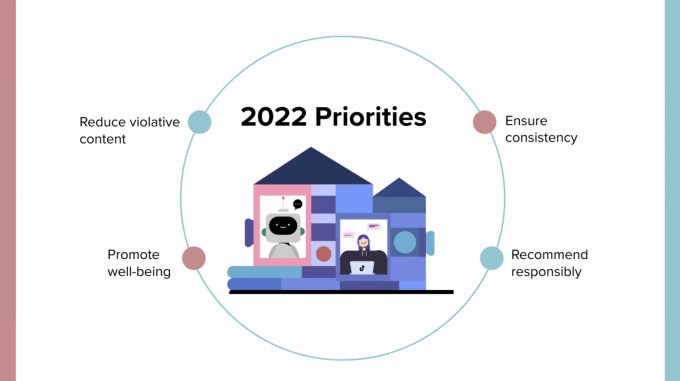
Image Credits: TikTok
In another attempt to get ahead of regulation, TikTok announced a series of policy updates and plans for new features and technologies aimed at making the video-based social network a safer and more secure environment, particularly for younger users. The changes attempt to address some concerns raised by U.S. senators during their inquiries into TikTok’s business practices, including the prevalence of eating disorder content and dangerous hoaxes on the app, which are particularly harmful to teens and young adults. In addition, TikTok is laying out a roadmap for addressing other serious issues around hateful ideologies with regard to LGBTQ and minor safety — the latter which will involve having creators designate the age-appropriateness of their content.
Notably, the new policy specifies that practices like deadnaming and misgendering, misogyny or content supporting or promoting conversion therapy programs will not be permitted on TikTok.
One of the interesting changes is that TikTok will try to assess content on the backend and assign a level of content maturity to it, in order to direct adult-focused content — even if just boring “workplace tips” — away from the app’s younger users. It will also allow creators to specify if their content is more appropriate for an adult audience so they can grow their community by reaching the right users’ For You feeds.
And TikTok says it will implement tech to pop people’s “filter bubbles” a bit more, so it can direct users away from content that could send them down dangerous paths. For example, watching diet and exercise videos here and there can be fine, but when a user starts to watch a lot of these in a row, it could lead to an eating order diagnosis, the company notes.
The new policies sound good on paper, but enforcement here is critical — and difficult. In the past, TikTok has allowed misogyny and transphobic content to slip through the cracks, repeatedly. At times, violative content was even promoted by TikTok’s algorithms, according to some tests.
Apple introduces “Tap to Pay on iPhone”
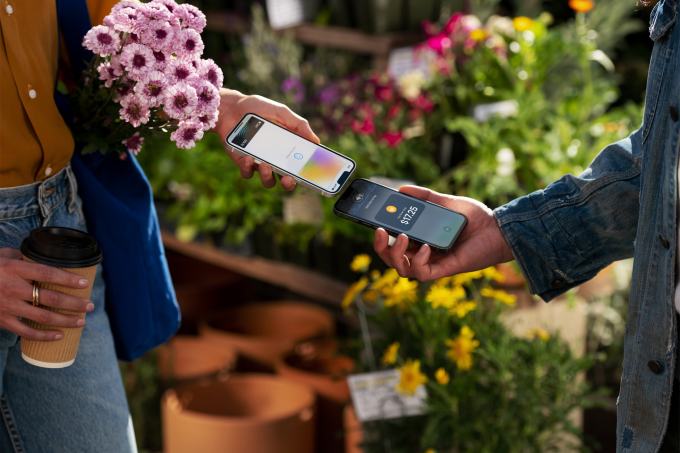
Image Credits: Apple
Apple formally introduced a new capability for iPhone that will soon allow U.S. merchants to accept Apple Pay, credit and debit card payments, and other digital wallets, with just a tap of one iPhone to another. The NFC-powered feature would mean there would no longer be a need for a separate payment terminal — a move that some positioned as a Square killer, though that’s not quite correct. It would potentially eliminate some of the need in the market for payment dongles and terminals, but companies like Square aren’t just selling hardware. They offer businesses and merchants a suite of tools and services in addition to payment processing. Apple says new functionality will be available to payment platforms and app developers in an upcoming iOS software update.
Stripe will be one of the first payment platforms to offer Tap to Pay on iPhone to their business customers, including the Shopify Point of Sale app, starting this spring. Other payment platforms and apps will follow later this year. The timing for this launch may be right, as now Apple Pay has reached over 90% acceptance by U.S. retailers and the pandemic has pushed more people to learn how to use contactless payments, as well.
Weekly News
Platforms: Apple
- Apple ships iOS 15.3.1, iPadOS 15.3.1 and macOS Monterey 12.2.1. The key update here is a patch for a WebKit flaw that may have been actively exploited. This is Apple’s third zero-day patch this year so far. It also released watchOS 8.4.2.
- The Apple iOS 15.4 beta 2, available to developers and beta testers, introduced the “Tap to Pay on iPhone” API after Apple publicly announced plans to turn iPhones into contactless payment terminals. It also includes Universal Control (on iPadOS) and the feature that lets you use Face ID while wearing a mask. iPadOS 15.4, tvOS 15.4 and watchOS 8.5 are also available.
- Apple announced new “App Store Sessions,” which will allow developers to learn from Apple experts about new App Store features and get questions answered. The new sessions will run from February 15-March 29 and will focus on creating product pages, subscriptions, custom offer codes and in-app events.
Platforms: Google

Image Credits: Google
- Google released the first developer preview of Android 13 (aka Tiramisu). The release doesn’t have many consumer-facing improvements, but one that stands out is that it will bring Material You to all app icons, initially on Pixel — developers will have to provide a monochromatic icon for this to work. There’s also a new system-wide photo/video picker that will allow users to pick an image without giving the app permission to all their media. Other changes include making it easier for apps to access a list of Wi-Fi devices; per-app language preferences; a way for developers to showcase if an app offers Quick Setting tiles; programmable shaders; updates to the Android core libraries; runtime notification permissions; and continued Project Mainline improvements, among other things.
- Google released version 1.1 of Jetpack Compose, Android’s modern, native UI toolkit with new stable features and APIs.
- Flutter, Google’s open source UI software development kit, arrived on Windows, allowing developers to build Windows apps that can also run on mobile and the web.
- Google is also making Android’s Material You’s dynamic color theming more broadly available. Initially, a Pixel-only feature, Material You is now coming to Samsung, OnePlus, Oppo, Vivo, Realme, Xiaomi and other OEM partners’ devices. To help developers get started with Material You, Google published a Customizing Material article with codelabs and guides to get started with Views or Jetpack Compose. In the next few months, it will also roll out a Material Theme Builder and Material Color Utilities.
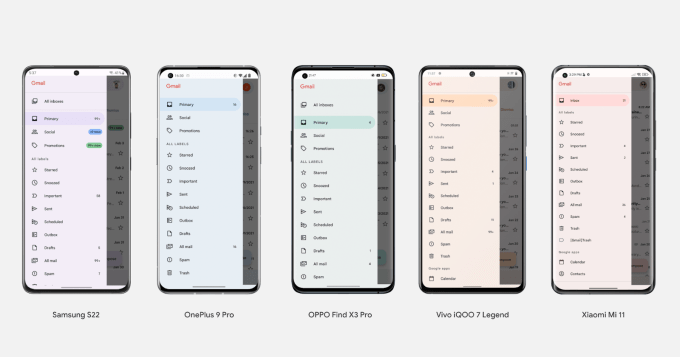
Image Credits: Google
- Samsung and Google expanded their Wear OS partnership. Google said its Google Assistant will arrive on Samsung smartwatches in the months ahead. The Galaxy Watch 4 will also display a list of the available Play Store apps that can be downloaded to the device with a tap.
E-commerce
- YouTube says it will expand access to shopping across its video platform through shoppable videos, Live Shopping experiences and more. One test with Walmart and others had more than 2 million views and 1.4 million Live Chat messages, the company said.
- Instagram is hosting a live shopping event on its app for Valentine’s Day. Summer House star Paige DeSorbo will join Instagram’s @shop for a live shopping event on February 14th at 2 pm PT / 5 pm ET, where she’ll being joined by guests to share dating advice, well-being tips and favorite gift ideas. Instagram’s Kristie Dash will also join to share trending products.
- The top 15 direct-to-consumer (D2C) shopping apps grew downloads by 13.6% for the third consecutive year, from 4Q 2020 to 4Q 2021, reported Apptopia.
Augmented Reality
- References to “realityOS” were spotted in Apple’s code on a GitHub repo, suggesting work continues on an AR headset OS. The leak confirmed previous rumors of the name and that apps through an App Store would be available.
Fintech/Crypto
- YouTube confirms its plans to get into NFTs. Chief Product Officer Neal Mohan said he believes YouTube can “add a lot of unique value” to what people are doing in the NFT space, which includes artists minting their work, using NFTS to manage a community of common interests and crowdfunding to help creators.
- Block (previously known as Square) officially turned on bitcoin transfers via the Lightning Network for U.S. users of its Cash App, as recently promised.
Social
- Twitter has a new CEO and lots of new stuff, but it still can’t deliver the user growth Wall Street wants. Twitter’s mDAUs grew to 217 million in Q4 2021, up 6 million from the prior quarter, but investors had wanted to see at least 8 million new mDAU additions. The company also fell short on revenue, reporting $1.57 billion in revenue, versus $1.58 billion expected, noting it had needed “additional time, energy and resources” to retool its revenue products in light of Apple’s privacy changes on iOS. But Twitter now believes the product improvements that were made will help to reduce the impact of those changes going forward.
- Reddit expanded its Clubhouse-like live audio product, Reddit Talk, which now supports recordings, a desktop web version and a test of highlighting chats at the top of users’ home feeds.
- YouTube Shorts, YouTube’s short-form platform, will gain new video effects, editing capabilities, the ability to reply with video comments and Super Chat monetization tools, as the tech giant tries to keep up with TikTok.
- Tumblr added a Tip Jar feature to its app on iOS and Android, as well as the web, which allows fans to donate directly to Tumblr creators. Tumblr isn’t taking a cut (though there are credit card fees of 2.9% + $0.30), so it’s technically allowed to bypass Apple and Google’s in-app payments systems. Of note, Tumblr is pointing users to the tips feature by way of an in-app link. That means if regulations ever change in its favor, Tumblr’s userbase will already be primed to look to tip via a link — and Tumblr could start tapping into that revenue flow immediately.
- Instagram added new features, including a “Your Activity” section to manage in-app activity, bulk delete interactions and content, filter and sort content and interactions by date, and more. It’s also rolling out “Security Checkup” to users worldwide, allowing anyone to check login activity, review their profile information, confirm the accounts that share login information and update their account recovery information, such as a phone number or email address. A feature being tested will allow two friends to confirm your identity in the case you’re account has been hacked.
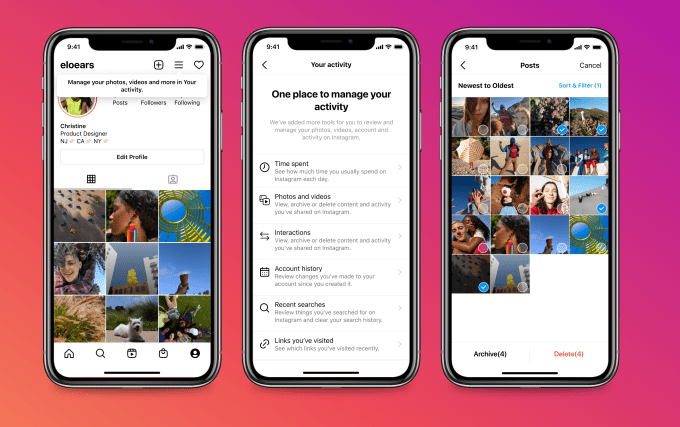
Image Credits: Instagram
- Apple’s Siri is the first voice-based digital assistant to be able to initiate searches on Douyin, the Chinese version of ByteDance’s TikTok. The functionality aims to make it easier for users to search across Douyin, but would also seemingly give Apple access to Chinese users’ voice data, if permitted. Or maybe if not — Apple recently admitted that a small number of iPhones accidentally recorded Siri interactions even when users had opted out.
- Amazon’s Ring updated its Neighbors app with support for new features, including Pet Profiles and Contact Me. The Pet Profiles will help users quickly share critical information with their neighbors if their pet is lost, like name, breed, weight, color and more. Contact Me introduces a way for users to customize how they want to be contacted — SMS, phone or both, and will save them from having to share their personal phone number in the post itself.
Messaging/Chat
- Messenger rolled out its Split Payments feature, previously in testing, to all U.S. users on iOS and Android. The Venmo-like addition allows users to share the cost of bills through the app, like dinners or household expenses.
- Google Duo, Google’s video chat app, gained a SharePlay-inspired feature called Live Sharing that allows users to brainstorm new ideas using Google’s digital whiteboard Jamboard, share photos with Gallery, share notes with Samsung Notes, search for locations in Google Maps and watch videos together on YouTube. Access is not (yet?) open to third-party apps as with SharePlay, however. Live Sharing will launch first to Samsung’s new devices followed by other Samsung and Pixel devices, then other Android phones and tablets.
- Signal’s messaging app now lets you change your phone number without losing your conversation threads and group chats through its new “Change Phone Number” feature.
Streaming & Entertainment
- YouTube will gain a new feature that will let you read and write comments on your phone while watching on the TV, as well as share videos with friends.
- And YouTube TV is getting a redesign this year, which will introduce a new user interface, including updates to the Library and LIve sections.
- Chinese audio networking app Tiya, a sort of Clubhouse of China, has set up a new 10,000-square-foot headquarters in Singapore and will open its doors to the local market. Worldwide, the app has nearly 20 million downloads.
- Code inside the Apple Music app on Android beta reveals Apple’s new classical music streaming service may be called Apple Classical. Apple acquired Primephonic last year to help build the service.
Gaming
- Mobile gaming giant Zynga says it has plans to move into blockchain and NFT-based games, which will include partnerships, web3 acquisitions and expansion of its blockchain team from 15 to possibly 100. The company recently announced its acquisition by Take Two in a $12.7 billion deal, but the deal hasn’t closed.
- “Social gambling apps,” like social casino games where users bet with virtual money, are seeing increased adoption as gambling has become more normalized in society, reported Axios. Analysis of Android app data saw global downloads of social gambling apps increase from 33 million in 2012 to 1.39 billion in 2020. Of 1,132 games analyzed, 1,107 (~98%) were targeted at ages 12+ or lower.
- Newzoo and TikTok For Business put out a joint report on the use of the short video platform to build, grow and monetize mobile games. Among the highlights: viewership hours of TikTok’s top 100 gaming topics grew 533% between Q1 2020 and Q1 2021; TikTok gamers install 50% more games than non-TikTok gamers, play 36% longer and are over 40% more likely to pay for games/add-ons.
Dating
- Tinder introduced a new “Blind Date” feature that pairs up two people in the app’s Explore section and allows them to enter a timed chat after answering a few icebreaker questions. But neither can see the other’s profile until the chat ends.
- Tinder is also ending the practice of charging different prices for the same features. The app had been criticized for charging older people more money for subscription services, after a report showed users ages 30-49 paid an average of 65.3% more. While it’s common for companies to offer student discounts, Tinder had taken things further and was actually pricing things based on age alone, not school status.
Health & Fitness
- Open rates of some official COVID-19 apps reached as high as 92% in 2021, according to App Annie data. Malayia’s MySejahtera saw the 92% open rate, followed by Saudi Arabia’s Tawakkalna at 89%. India’s Aarogya Setu had the most downloads, at over 100 million.
News & Reading
- Apple launched its own book club inside its Apple Books app. The club, “Strombo’s Lit,” is headed by a Canadian media personality and Apple Music host, George “Strombo” Stroumboulopoulos.
Productivity
- Flexibits’ Fantastical takes on Calendly with a new feature, “Openings,” that lets users share a link to schedule a meeting. The option is available in version 3.6 on macOS, iOS, and iPadOS.
Government & Policy
- The Netherlands regulator, the Authority for Consumers and Markets (ACM), fined Apple another €5 million over its dating app payments order, bringing Apple’s total penalty so far to €15 million. Apple was ordered to allow dating apps to use third-party payments, but dragged its feet on detailing the requirements. Apple says apps will have to submit a separate app binary and will still have to pay a 27% commission, but hadn’t provided this information to the ACM directly nor in a timely fashion, having only published vague statements about its plans on the Apple.com website.
- The Verge took a dive into the Open App Markets App, which is aimed at limiting anti-competitive behavior from app store operators, like Apple and Google. The bill is headed to a Senate vote.
Security & Privacy
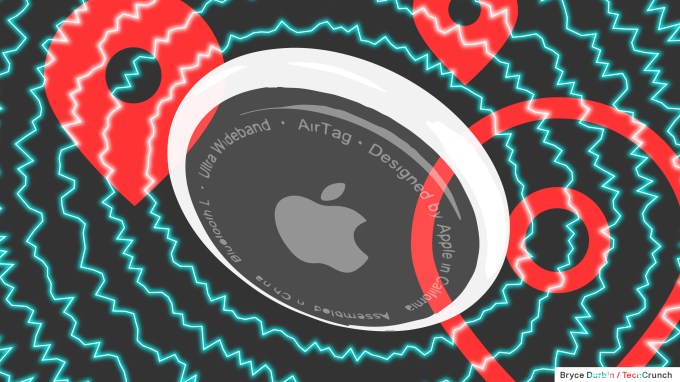
Image Credits: Bryce Durbin/TechCrunch
- Apple addressed the AirTag stalking problem with a slate of upcoming features and changes. The company acknowledged AirTags were being used for unintended purposes and says it’s been working with law enforcement to turn over account info for those who tracked victims or their property. In an update, AirTags will more explicitly tell users that stalking with AirTags is a crime, and will change AirTag sounds to be louder, will send a notification to a device when you’re nearby an unknown AirTag and will allow users to leverage precision finding with AR (on supported models) to find unknown AirTags, as they could with their own. It will also stop scaring users with “Unknown Accessory Detected” alerts, which really just meant AirPods were nearby — it will say “AirPods” instead.
Funding and M&A
 San Diego-based travel app Sēkr raised a $2.25 million seed round to bring campsite inventory online in its mobile app for campers, outdoors enthusiasts and #VanLife wanderers. The company says it has 10,000 user sessions per week.
San Diego-based travel app Sēkr raised a $2.25 million seed round to bring campsite inventory online in its mobile app for campers, outdoors enthusiasts and #VanLife wanderers. The company says it has 10,000 user sessions per week.
 Computer vision startup Scandit raised $150 million in Series D funding for its tech that scans barcodes, ID cards or other physical objects to trigger automated responses. The company has 1,700 business customers in verticals like retail, travel, transportation, healthcare and more.
Computer vision startup Scandit raised $150 million in Series D funding for its tech that scans barcodes, ID cards or other physical objects to trigger automated responses. The company has 1,700 business customers in verticals like retail, travel, transportation, healthcare and more.
 Egyptian investment app Thndr raised $20 million in Series A funding from Tiger Global, Dubai-based BECO Capital and Prosus Ventures. The app, which allows users to invest in Egyptian stocks and mutual funds, has more than 300,000 downloads.
Egyptian investment app Thndr raised $20 million in Series A funding from Tiger Global, Dubai-based BECO Capital and Prosus Ventures. The app, which allows users to invest in Egyptian stocks and mutual funds, has more than 300,000 downloads.
 India’s ShareChat and MX Player agreed to merge their short-form video apps, Moj and MX TakaTak, in a deal valued at $900 million. The combined app would reach over 300 million users.
India’s ShareChat and MX Player agreed to merge their short-form video apps, Moj and MX TakaTak, in a deal valued at $900 million. The combined app would reach over 300 million users.
 To better compete with Spotify, Apple quietly acquired a London-based startup, AI Music, which generates personalized soundtracks and music recommendations based on users’ input and data.
To better compete with Spotify, Apple quietly acquired a London-based startup, AI Music, which generates personalized soundtracks and music recommendations based on users’ input and data.
 Investing app Betterment acquired crypto investing startup Makara, which also offers a robo-investing feature for crypto similar to Betterment’s robo-investing feature for traditional investment. Deal terms weren’t disclosed.
Investing app Betterment acquired crypto investing startup Makara, which also offers a robo-investing feature for crypto similar to Betterment’s robo-investing feature for traditional investment. Deal terms weren’t disclosed.
 Spain’s Rosita Longevity, an app designed to help seniors be more active, raised €2.4 million ($2.8 million) in seed funding led by Barcelona-based impact fund Ship2B Ventures. The app offers human coaching digital classes, nutritional info, and more, and is now expanding to the U.S.
Spain’s Rosita Longevity, an app designed to help seniors be more active, raised €2.4 million ($2.8 million) in seed funding led by Barcelona-based impact fund Ship2B Ventures. The app offers human coaching digital classes, nutritional info, and more, and is now expanding to the U.S.
 Koho, a challenger bank that lets Canadian users access up to 50% of their paycheck every day, raised a CAD$210 million Series D in equity and debt led by Eldridge.
Koho, a challenger bank that lets Canadian users access up to 50% of their paycheck every day, raised a CAD$210 million Series D in equity and debt led by Eldridge.
 Berlin-based financial super app and challenger bank Vivid Money raised €100 million ($114 million) in a Series C round of funding led by Greenoaks Capital. The funds value the startup, which plans to have 1 million users by year-end, at €775 million ($886 million).
Berlin-based financial super app and challenger bank Vivid Money raised €100 million ($114 million) in a Series C round of funding led by Greenoaks Capital. The funds value the startup, which plans to have 1 million users by year-end, at €775 million ($886 million).
 Female-founded lung-health startup Respira Labs, which makes a hardware-connected device that works with an iOS app, raised $2.8 million in a combination of funding and grants to continue building its acoustic resonance technology for assessing lung function.
Female-founded lung-health startup Respira Labs, which makes a hardware-connected device that works with an iOS app, raised $2.8 million in a combination of funding and grants to continue building its acoustic resonance technology for assessing lung function.
Downloads
Joe Danger on iOS
Well, this one got to me! Hello Games (No Man’s Sky) founder Sean Murray posted to Twitter as to why the company decided to re-release the older iOS game Joe Danger. He said they received fan mail from a parent of an autistic child who loved the game, which had sadly stopped working on newer versions of iOS. The child often received game time with Joe Danger as a reward and had bonded with family and friends over the game, too. The game also served as a coping mechanism when he was in uncomfortable situations, like crowed rooms or loud places.
“As game devs it’s so easy to underestimate the impact even your smallest games can have,” Murray wrote. “It blows my mind that something you make can be someone’s first game they played, hit at an important time or even be their favorite thing for a while.”
The new version has been remastered with improved visuals, high frame rates, ProMotion and Gamepad support, and now works on newer versions of iOS.
Powered by WPeMatico










